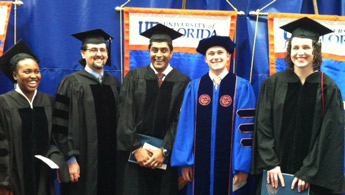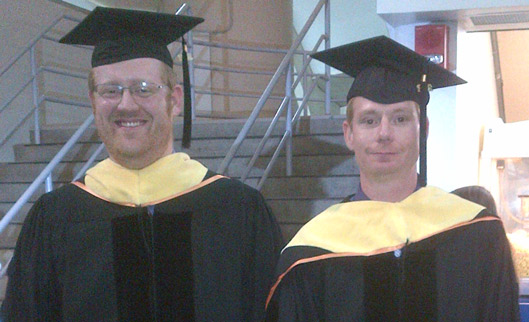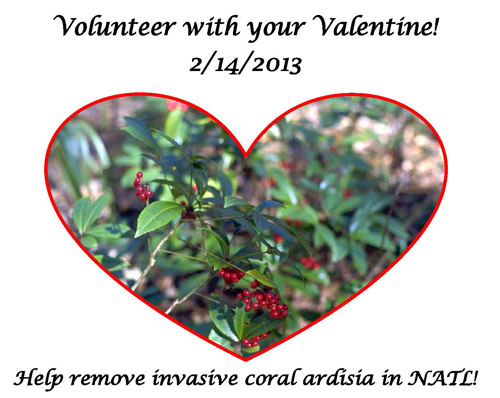- Faculty News
- Student News
- Lab News
- Publications
- Meetings and Presentations
- Outreach
- Grants
- Announcements
- About This Newsletter

ABOVE: Just a few of our Fall 2012 graduates! From left to right: Dr. Corraine McNeill, Dr. Luis Matos, Dr. Gurpreet Brar, Dr. Daniel Swale, and Dr. Clare Scott. See the impressive list of graduates below in Student News.
The School of Ants, led by Dr. Andrea Lucky, was featured in an artcle by the UF news service. The School of Ants now is focusing its efforts on sampling ants in Florida. You can find out how to participate at www.schoolofants.org.
The Kaufman Lab would like to welcome Dr. Donald Rutz from Cornell University and Dr. Andreia Leffer from the University of Sao Paulo, Brazil to the department. Don is a Professor of Veterinary Entomology with considerable experience in dairy and poultry pest management. He will be working in the area of IPM of house flies and stable flies. Andreia is working here under a visiting post-doctoral fellowship provided by the Sao Paulo Research Foundation (FAPESP). Her research will focus on the identification of insecticide resistance in house fly and lesser mealworm populations at Florida poultry farms. Please stop in to welcome these two visitors to the department.
Dr. Christine Miller presented an invited seminar as part of the UF Biology Department seminar series on January 8th. The title of her seminar was “Sexual selection in complex environments.”
Maria F. Checa was awarded a Schmink Award for Innovation in Tropical Conservation & Development (TDC) from the TCD program to support her innovation project entitled “Feasibility of butterfly farming initiatives as a viable tool for sustainable development and capacity building in Western Ecuador.” She currently is pursuing a joint degree in Entomology (Ph.D. with Dr. Keith Willmott) and in the Center for Latin American Studies (Master Program in Sustainable Development -MDP). This awarded project combines components of her current Ph.D. thesis and the practicum she will carry out as part of the MDP.
The Schmink Innovation Award seeks to ensure the long-term impact of the TCD Program around the world by catalyzing new ideas and innovative approaches and by enabling shared learning throughout the tropics.
Wendy Helmey-Hartman received a 2012 Graduate Student Mentoring Award through the UF Innovation through Institutional Integration (I-Cubed) program. This award recognizes graduate students at the University of Florida who take time to help others succeed as graduate or undergraduate students or in K-12 classrooms.
Wendy Helmey-Hartman has been selected for the Navy Health Services Collegiate Program. Through this program, she will serve officially on active duty while working full-time to complete her Ph.D. and then serve an additional minimum three years of active duty as a Navy Entomologist after graduation.

Congratulations to our December 2012 graduates!
Ph.D. Graduates
Dr. Gurpreet Brar
Dr. Luis Matos
Dr. Corraine McNeill
Dr. Clare Scott
Dr. Nicholas Sekora
Dr. Daniel Swale
Dr. Court WhelanMaster’s Graduates
Natasha Agramonte
Trenton Frazer
Andrew Lima
Brooke Moffis
Jose Bernardo Navarrete
Lin Xing
Bachelor’s Graduates
Rachael Keels
Megan Kelley
Zachary Miles
Joshua Fonzi
 Doctor of Plant Medicine (DPM) News
Doctor of Plant Medicine (DPM) News

Above: Two DPM students graduated in the fall semester of 2012- Ken Johnson (left), advised by Dr. Norm Leppla, and Todd Leeson (right), advised by Dr. Gary Leibee. Photo courtesy of DPM student Courtney Buckley.
DPM is pleased to welcome Keumchel Shin to the program during spring semester 2013. Keumchel is advised by Dr. Jason Smith, a forest pathologist with the UF School of Forest Resources and Conservation.
Need to name that bug? A host of experts are available to help Floridians identify any insect or related arthropod. If a mystery creature has six or more legs, the UF Insect ID Lab is the place to call. Lyle Buss, the Insect ID Lab manager, reported that the lab reached a new high in 2012, receiving 587 physical samples during the year.
Ants remained one of the most common pest groups in homes and yards, accounting for 61 of the samples (10%). Termite samples were a close second (58 samples). Spiders and ticks accounted for 22 and 18 samples, respectively. Most of the rest of the samples were of a variety of household or plant pests. In last month’s newsletter I talked about “invisible itch” samples, where clients report skin problems due to unseen insects or mites. These cases represented a significant portion of the sample load for the year, with a total of 55 samples from 34 different people.

Think it might be a nematode problem? The Nematode Assay Laboratory serves Florida and other states by providing nematode assay and expert advice regarding nematode management. For more information on the Nematode Assay Laboratory please contact the Lab Manager Dr. Tesfa Mengistu.
Alto BW, Lounibos LP. 2013. Vector competence for arboviruses in relation to the larval environment of mosquitoes. In Takken W, Koenraadt CJM (eds) Ecology of parasite-vector interactions. Ecology and control of vector-borne diseases, Volume 3. Wageningen Academic Publishers, Netherlands, pp. 81-101.
Brown HE, Harrington LC, Kaufman PE, McKay T, Bowman DD, Nelson CT, Wang D, Lund R. 2012. Key factors influencing canine heartworm, Dirofilaria immitis, in the United States. Parasites and Vectors 5: 245. DOI:10.1186/1756-3305-5-245.
Xiao Y, Avery P, Chen J, McKenzie C, Osborne L. 2012. Ornamental pepper as banker plants for establishment of Amblyseius swirskii (Acari: Phytoseiidae) for biological control of multiple pests in greenhouse vegetable production. Biological Control 63: 279-286.
New on Featured Creatures:
Air potato leaf beetle (suggested common name), Lilioceris cheni Gressit and Kimono. Authors: Ted D. Center, USDA-ARS Invasive Plant Research Laboratory; William A. Overholt, University of Florida, Indian River Research and Education Center, Fort Pierce, Florida.
Spiral nematode, Helicotylenchus pseudorobustus. Author: William T. Crow, University of Florida
Tropical soda apple leaf beetle, Gratiana boliviana Spaeth. Authors: Rodrigo Diaz, William A. Overholt, Indian River Research and Education Center, University of Florida; Ken Hibbard, Julio Medal, Florida Department of Agriculture and Consumer Services.
Do you have a favorite creature? Learn how to make it into a Featured Creature!
Stephanie Stocks hosted an exhibit featuring Protect U.S., the Community Invasive Species Network at the annual Southeastern Fruit and Vegetable Conference in Savannah, GA, January 10th to 13th. The exhibit will feature scripted presentations and e-learning modules focused on small farms audiences at the conference. Protect U.S. is a national extension educational partnership between the National Plant Diagnostic Network (NPDN), USDA-APHIS-PPQ, the Regional IPM Centers, and other interested groups.
Questions regarding the Protect U.S. program can be directed to its coordinator, Stephanie Stocks, Assistant-In, Extension Scientist, UF Department of Entomology and Nematology.
Dr. Amanda Hodges, DPM Director, and DPM students Eric LeVeen and George Fox hosted a DPM program promotional booth at the annual Southeastern Fruit and Vegetable Conference in Savannah, GA, January 10th to 13th. Questions regarding the DPM program can be sent to the DPM Director.
Getting Social
The DPM program would like to invite our newsletter readers to like our Facebook page to keep up with our events and developments. Be sure and "Like" the DPM Facebook page.
We have several social media sites for the Entomology & Nematology Department. To make them easily searchable, all three (YouTube, Facebook and Twitter) have the same page name, UFEntomology. Please share these links with past students or colleagues who may have an interest in departmental activities.

Honey Bee Research and Extension Laboratory wants you to follow them on twitter to find out about upcoming events and interesting stories about honey bees @UFHoneybeelab.
 From the Outreach Coordinator
From the Outreach Coordinator
The Florida State Fair will be held from February 7th to the 18th this year at the Florida State Fairgrounds in Tampa. The Department’s booth will be in the Florida Agriculture Hall of Fame and will be part of the Florida Entomological Society's Insect Encounters. During the course of the fair, we expect more than 60,000 people of all ages to visit the Agriculture Hall of Fame.
This year, as our theme, we would like to feature research that faculty and students in this department are conducting on various entomological topics. If you are interested and available, we would like for you to pick a day (or 2 or 3 if you would like) to bring yourself and/or your graduate students and an interactive display to the fair featuring the research your lab and students are doing or recently have done.
We will have a few outreach critters (and a graduate student volunteer to help with them) as backup.
The exhibit should be manned between 9:00 and 4:30. The outreach van is available for use to drive down and back (if you are on campus). If you would like to do 2 days in a row, you will need to find hotel accommodations. Otherwise, this will be a day trip. We will need to know how many people will be helping out and on which days so that tickets can be ordered. Please let me know by Friday, January 18th at noon if you are interested and who will be going.
The live critters are always a hit with children and adults alike. The critters are available for you to check out should you be leading an outreach event. We have doubles of our most popular critters, as well as various native insect species depending on the time of year. We have large wood and Plexiglas cages for viewing our native orb weaving spiders. There is one travel cage and one larger static cage. Please be sure to contact us and review the protocol on transporting and handling the critters if you are not already familiar with it. If you lead an outreach, be sure to fill out a documentation form so your event can be included in the newsletter and we can log all outreach events.
If you would like to schedule an event or have any outreach questions, go to the Outreach pages on our Bug Club Website and contact us. I look forward to working with all of you over the next four years.
- Stephanie Stocks, Outreach Coordinator
- Office number 352-273-3958
Virni Mattson, our Grants Specialist, reports that December 1st, 2012 to December 31st, 2012 we have had five new grants or contracts awarded for a total of $170,805 in external funding for all Entomology & Nematology faculty (in Gainesville and at RECs).
Talks start at 3:30pm, Refreshments at 3:20pm. Room 1031 Steinmetz Hall.
Date |
Speaker |
Title / Topic |
Jan. 17 |
Dr. Mirian Medina Hay-Roe, USDA-ARS |
Interactions between Spodoptera frugiperda (Noctuidae), its host plants and parasitoids
|
Jan. 24 |
Dr. Keith Choe, UF Biology |
Defining and targeting a stress resistance and drug detoxification pathway in C. elegans
|
Jan. 31 |
Dr. Marc Schetelig, USDA-ARS Tallahassee & Gainesville |
Benefits of genetically-modified organisms for improved insect pest control
|
Feb. 7 |
Dr. Andrea Lucky, UF Entomology & Nematology |
The Rise of Ants – out of the earth
|
Feb. 14 |
Dr. Pete Obenauer, US Navy |
TBA
|
Feb. 21 |
Dr. David Houle, FSU Biology |
Why phenomics?
|
Feb. 28 |
Dr. Akito Kawahara, Florida Museum of Natural History |
Stridulating genital valves: The evolutionary origins of anti-bat behavior and ultrasound production in hawkmoths
|
Mar. 14 |
Dr. Michelle Leonard, UF Marston Science Library |
Ethics in research
|
Mar. 21 |
Dr. John Clark, Univ. Massachusetts |
Human lice: simplistic lifestyle, small genome, much misery
|
Mar. 28 |
Dr. Robert Rabaglia, US Forest Service |
TBA
|
Apr. 4 |
Dr. Alex Wild, Univ. Illinois |
Talk 1: Traveling across the taxonomic impediment: Tales from tropical wasps Talk 2: How to take better insect photographs |
Apr. 11 |
Dr. Emilie Snell-Rood, Univ. Minnesota |
Costs and constraints in the evolution of developmental plasticity and learning: lessons from butterflies and beetles
|
Apr. 18 |
Dr. Caroline Williams, UF Entomology & Nematology |
Evolution of energy metabolism in cold-adapted Drosophila melanogaster
|
Seminars are available by Polycom for those at remote sites. Dial 7832000 at 3:20, ten minutes prior to the seminar. Please note that this number has recently changed. For meetings with the seminar speaker or related questions, please contact Dr. Christine Miller.

Departmental Vans
The department has three vans available for general use. Personnel are reminded that when returning vans after the administrative office has closed, the vans should be locked and the keys deposited in the "mail slot" on the office door. This ensures that people who reserved the vans for the next day have immediate access to the keys. Placing the keys under the driver's seat in an unlocked van is not an acceptable substitute. The worst case scenario in this case is a stolen van to which no one has access. Keeping the keys in your pocket, lab or office until you remember to turn them in is also discourteous to others as it might affect their work schedule. Some additional guidelines are:
- The vans were acquired for transport of students to the field for laboratory periods. This activity takes precedence over others.
- The vans should only be used for transport of large groups, not as a substitute for regular autos or trucks. It is not logical or economic to use these large vehicles that are expensive to operate and maintain as substitutes for small vehicles.
- Anyone needing transport regularly for other than student laboratories should borrow a vehicle from another lab, acquire a vehicle for their lab, or rent a vehicle (Avis or Enterprise).
- The vans are fine for local transport but are now over 10 years old, so long distance driving should be avoided.
The 3 Rs - Reading Room Rules
The Reading Room Committee reminds us that no one is allowed to take materials out of the reading room, and no one is allowed to take food or drink in. You also are reminded that Reading Room users are monitored on closed-circuit TV. The committee requests that you tidy up after yourself before leaving the room. Those who wish to use the in-room copier should visit the stock room to obtain a PIN from Nick Hostettler.

Volunteer with your Valentine (or find a new friend)!
Help remove the invasive plant coral ardisia in the Natural Area Teaching Lab (NATL), our next-door neighbor. Great for romantics or realists: spend quality time outside destroying a damaging plant. Volunteers should wear close-toed shoes and long pants. For this activity you will be walking in the woods off trails. Snacks will be provided.

When: Valentine's Day- Thursday February 14th, 10:00 to 12:00 and 1:00 to 3:00.
Where: The Natural Area Teaching Lab, across from the Entomology building behind the cultural plaza. Meet at the NATL pavilion at 10:00 or 1:00 for instructions!
Take a look at our Facebook and Twitter accounts for more information about this event and NATL. You can read both without logging on.
Dr. Jennifer Gillett-Kaufman is the newsletter editor and does the HTML coding. Issues usually are published by mid-month. Submit items for an issue by the 7th of that month.
We would like to share news when it happens using our social media outlets- Twitter, Facebook and YouTube. Follow us on these sites for daily updates! When you send news, we will post it on one or more of these sites and again in the monthly newsletter. Please be sure you have permission from people in photographs you submit for publication.
UF-Bugnews-L listserv subscribers receive notices when issues are posted. Our home page has instructions for subscribing and unsubscribing.
Special thanks to Dr. Verena Lietze and Nancy Sanders who reviewed the newsletter for errors and to Jane Medley who built the web page.